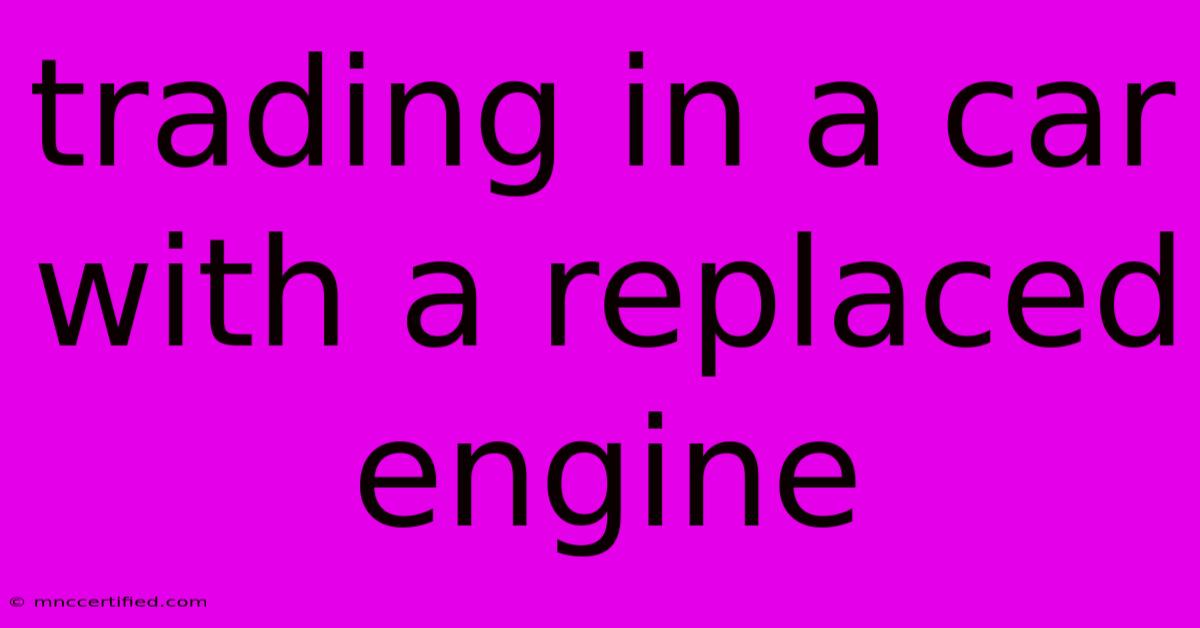Trading In A Car With A Replaced Engine

Table of Contents
Trading In Your Car with a Replaced Engine: What You Need to Know
Selling a car can be a hassle, but trading it in for a new one can seem like a smoother process. However, what happens when you've had a major repair like an engine replacement? Does this impact your trade-in value, and what do you need to know? Let's dive into the details.
The Impact of a Replaced Engine on Trade-in Value
The truth is, a replaced engine can significantly affect your trade-in value. While a new engine can breathe new life into your car, dealerships will likely view it as a potential red flag. Here's why:
- Uncertainty: Dealerships are hesitant to take on cars with major repairs, especially if the work wasn't done at an authorized service center. They worry about potential future issues and the cost of repairs.
- Lack of History: Even if the engine replacement was done professionally, the car's history is now altered. The dealership may find it hard to assess the long-term reliability of the engine, potentially lowering the trade-in offer.
- Documentation is Key: Having clear and detailed documentation of the engine replacement is essential. This includes receipts, service records, and even photos of the new engine installed. This helps build trust and demonstrates the quality of the work.
How to Maximize Your Trade-in Value
While a replaced engine can be a hurdle, you can still get a fair deal. Here are some tips to maximize your trade-in value:
- Be Transparent: Don't try to hide the engine replacement. Disclose it upfront to the dealership and provide all relevant documentation.
- Choose the Right Dealership: Look for dealerships with a reputation for fair trade-in practices and a good service department. They'll be more likely to appreciate the effort you've put into your car.
- Research Your Car's Value: Use online tools like Kelley Blue Book or Edmunds to understand the fair market value of your car, both with and without the engine replacement.
- Consider Private Sale: If you're comfortable with the process, selling your car privately might offer you a better price. However, be prepared for more negotiation and potentially more paperwork.
Tips for Negotiating a Trade-in
- Prepare to Negotiate: Be ready to discuss the engine replacement and its impact on the trade-in value. Have your documentation readily available.
- Focus on the Positives: Highlight other aspects of your car that are in good condition, like the interior, exterior, and maintenance records.
- Be Open to Compromise: Be willing to negotiate a price that's fair for both parties. Remember, the goal is to sell your car and get a good deal on a new one.
Alternatives to Trading In
If you're unhappy with the trade-in offer, consider these alternatives:
- Sell Privately: As mentioned earlier, selling your car privately can often lead to a higher price.
- Trade with a Private Party: You can negotiate with a private buyer, which might be more flexible than a dealership.
- Consignment Sales: Some dealerships offer consignment sales where you can list your car with them and they handle the sale, taking a commission.
Conclusion
Trading in a car with a replaced engine can be tricky, but with proper preparation and transparency, it's achievable. By understanding the potential impact on value, being upfront with dealerships, and exploring all your options, you can maximize your trade-in value and secure a fair deal.

Thank you for visiting our website wich cover about Trading In A Car With A Replaced Engine. We hope the information provided has been useful to you. Feel free to contact us if you have any questions or need further assistance. See you next time and dont miss to bookmark.
Featured Posts
-
Usha Officials Must Resolve Differences For 2036
Nov 09, 2024
-
Barbour James Bond Waxed Blazer Jacket
Nov 09, 2024
-
Additional Insured Blanket Endorsement
Nov 09, 2024
-
Scherzinger Clarifies Russell Comment Controversy
Nov 09, 2024
-
Georgia Insurance License Course Online
Nov 09, 2024